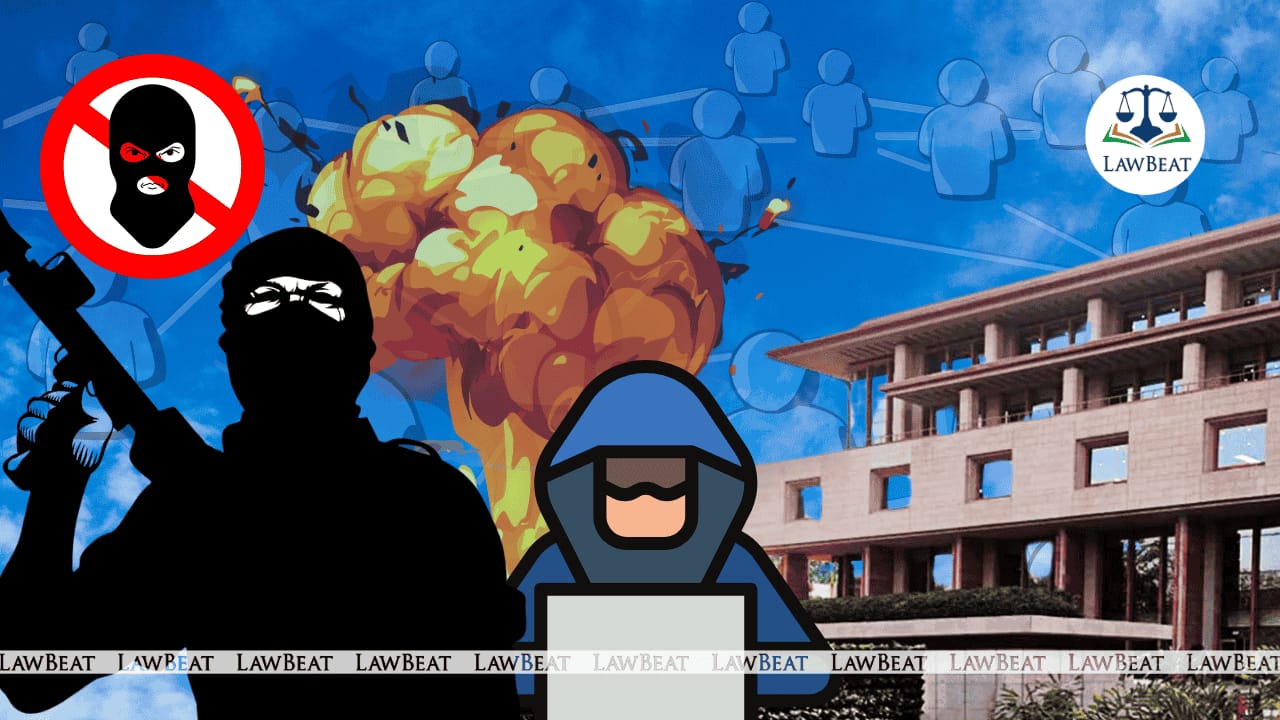Terrorists Using Journalistic Credentials To Publish And Disseminate Magazines To Incite Violence Cannot Be Ignored: Delhi HC

“The fact that the Appellants used fake identities to conceal their original identity and avoid tracing also cannot be ignored…The Appellants are technologically savvy persons who have made use of their educational qualifications to promote terrorism and incite offensive activities against the country”, the bench of Justice Prathiba M. Singh and Justice Amit Sharma highlighted.
The Delhi High Court, recently, held that terrorists using “journalistic credentials to publish and disseminate magazines to incite violence, also cannot be ignored”. The court made these observations in appeals filed by two individuals Hina Bashir Beigh and Sadiya Anwar Shaikh seeking a reduction in their sentence.
An FIR was filed by the Special Cell against certain individuals for their alleged involvement with the proscribed terrorist group Islamic State Khorasan Province (ISKP), part of ISIS. They were arrested on March 8, 2020, on accusations of conducting anti-national activities.
The case against Hina Bashir Beigh included allegations of disseminating ISIS materials to incite violence during anti-CAA protests and using anonymous social media accounts to further anti-national activities. Hina Bashir Beigh faced charges related to propagating terrorist material but was not implicated in direct conspiracy for terrorist acts. Sadiya Anwar Shaikh was linked to multiple Islamic groups and accused of seeking suicide jackets and inciting violence.
The court noted that the sentence awarded to Hina Bashir Beigh amounted to eight years under sections 38 and 39, to be served concurrently. For Sadiya Anwar Shaikh, the sentence was seven years under the same sections, also to be served concurrently. Hina Bashir Beigh has been in custody since March 23, 2020, with approximately four years and nine months already served. Similarly, Sadiya Anwar Shaikh had been in custody since July 29, 2020, and had served approximately four years and four months.
Regarding sentencing practices, the court observed that India had not established policy-level guidelines specifically for terrorism-related offences. In contrast, jurisdictions such as the UK, the US, and Sweden have formulated specific guidelines for sentencing in cases involving terrorist acts.
In India, the court noted the lack of specific sentencing guidelines, though noted that the recommendations for their introduction were made in March 2003. The Malimath Committee suggested that such guidelines would reduce uncertainty in sentencing, a view later supported by the Madhava Menon Committee in the Draft National Policy on Criminal Justice. News reports also indicated that the introduction of such guidelines was being considered.
The court citing the case of Pramod Kumar Mishra v. State of UP [(2023) 9 SCC 810], reiterated general factors such as the offender’s criminal record, age, employment, education, mental condition, and prospects for rehabilitation. Referring to the case of Sunder Singh v. State of Uttaranchal [(2010) 10 SCC 611], the court outlined aggravating and mitigating factors, including the brutality of the offence, emotional disturbance of the offender, and age-related concerns.
The court, also referencing the case of State of Madhya Pradesh v. Udham Singh [(2019) 10 SCC 300], noted that three tests were set out to determine sentences: the crime test (assessing crime details), the criminal test (considering the offender’s background), and the comparative proportionality test.
The court highlighted that, “While awarding sentences for terrorism-related activities, the Courts will have to, not merely bear in mind the crime committed but also the impact of the same and the propensity of the person to indulge in a similar crime in future”. The range of punishment is intended to allow courts discretion in weighing aggravating and mitigating factors. In India, where innocent individuals may be drawn into terrorism, the impact of reintegrating the convict into society must also be considered alongside their rights, the court added.
In the present cases, the court noted the role of technology in spreading terrorism via the internet and social media. The use of fake identities to conceal one's real identity and the misuse of encrypted platforms by terrorists are significant factors.
“While encrypted platforms permit and encourage privacy and freedom of speech and expression, the misuse of the same by terrorists and banned organizations also would have to be borne in mind”, the court emphasized.
The appellants, being technologically adept, used their education to promote terrorism and incite violence, which distinguishes their cases from those of innocent individuals unknowingly involved in crime. Other factors, such as the use of bitcoins for funding and journalistic credentials for spreading harmful propaganda, were also relevant.
Regarding the specific appellants, Hina Bashir Beigh and Sadiya Anwar Shaikh, their involvement with a proscribed terrorist organization was evident. Hina Bashir Beigh, who was the wife of A-1, allowed her laptop and phones to be used interchangeably with A-1.
Sadiya Anwar Shaikh, a student of journalism at the time of arrest, was also suspected of involvement in prior terrorism-related activities. While their youth and possible lack of full awareness of A-1’s plans were mitigating factors, their association with A-1 and involvement in inciting violence during protests had to be considered.
Based on the facts and circumstances, the court decided to reduce the sentences for Hina Bashir Beigh and Sadiya Anwar Shaikh. Hina Bashir Beigh’s sentence was reduced from 8 years to 6 years for offenses under sections 38 and 39 of the UAPA, with no fine imposed. Similarly, Sadiya Anwar Shaikh’s sentence was reduced from 7 years to 6 years for the same offenses.
For Petitioner: Advocates R K Thakur, Kanishka Dhoundiyal and Anoop Khanna
For Respondent: Special Public Prosecutor Rahul Tyagi with Additional Public Prosecutors Jatin, Vikas Walia with Advocates Sangeet Siboum Priya Rai and Abhishek Tomar
Case Title: Hina Bashir Beigh and Sadiya Anwar Shaikh v NIA (2024:DHC:8801-DB)
